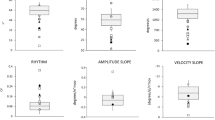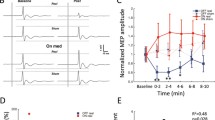Abstract.
In the present study we investigated whether the precentral component (N30) of short somatosensory evoked potentials (SEPs) to median nerve stimulation may be modified by peripheral neuromuscular blocking agent in patients affected by rigidity. We, therefore, recorded SEPs in nine Parkinson's disease (PD) patients and in seven psychotic patients affected by neuroleptic malignant syndrome (NMS), all showing severe rigidity. Each patient group was studied before and after the placebo, and before and after an atracurium besilate bolus of 0.05 mg/kg, in a single recording session. At the time of the test the PD patients had not taken any antiparkinsonian therapy for at least 48 h. The same recordings were also taken on nine neurologically normal subjects undergoing surgical procedures. Atracurium administration produced a remarkable amplitude increase of the major precentral component (N30) of SEPs. An atracurium-induced N30 amplitude increase was observed in both PD patients (from 2.41 to 4.07 µV) and NMS psychotic patients (from 2.03 to 3.97 µV), whereas there was a minor N30 amplitude increase in healthy subjects (from 3.53 to 4.10 µV). The N30 latency was unaffected. Amplitude and latency of the major parietal SEPs component (N20) was unchanged in the three groups studied. Our results lead to the conclusion that a neuromuscular blocking agent is capable of increasing the N30 amplitude in patients affected by severe rigidity, exclusively reducing their muscular tone without interfering with the central dopaminergic system. Thus, a "peripheral gating" of sensory input to the supplementary motor area due to rigidity may play a relevant role in producing the N30 amplitude decrease described in patients affected by degenerative or pharmacologically induced parkinsonism. The reduction of rigidity could be the mechanism by which dopamine may increase the precentral N30 amplitude in parkinsonian syndromes.
Similar content being viewed by others
Author information
Authors and Affiliations
Additional information
Electronic Publication
Rights and permissions
About this article
Cite this article
Pierantozzi, M., Sabato, A., Leonardis, F. et al. Curariform peripheral block of muscular tone selectively increases precentral N30 somatosensory evoked potentials component. A pharmacological study carried out on healthy subjects and parkinsonian syndromes. Exp Brain Res 133, 368–376 (2000). https://doi.org/10.1007/s002210000387
Received:
Accepted:
Issue Date:
DOI: https://doi.org/10.1007/s002210000387




